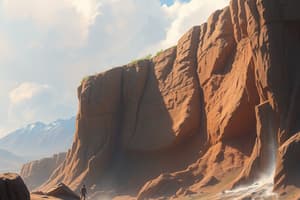Podcast
Questions and Answers
What is the definition of weathering?
What is the definition of weathering?
Weathering is the physical and chemical break down of rocks.
What is the definition of physical weathering?
What is the definition of physical weathering?
Physical weathering is where rocks break down through natural, physical means.
What is the definition of chemical weathering?
What is the definition of chemical weathering?
Chemical weathering is the chemical break down of rocks.
What is an example of physical weathering?
What is an example of physical weathering?
What is an example of chemical weathering?
What is an example of chemical weathering?
What is a rock that contains only one mineral?
What is a rock that contains only one mineral?
What is a rock that contains more than one mineral?
What is a rock that contains more than one mineral?
What are examples of crystals?
What are examples of crystals?
What is the rock cycle?
What is the rock cycle?
What is erosion?
What is erosion?
What type of rock is formed by the cooling or hardening of magma or lava?
What type of rock is formed by the cooling or hardening of magma or lava?
What type of rock is formed by the cementing together and hardening of sediments?
What type of rock is formed by the cementing together and hardening of sediments?
What type of rock is formed from other rocks by the action of heat and pressure?
What type of rock is formed from other rocks by the action of heat and pressure?
What are substances that occur naturally in the Earth and are the building blocks of rocks?
What are substances that occur naturally in the Earth and are the building blocks of rocks?
What are minerals or rocks from which metals can be extracted?
What are minerals or rocks from which metals can be extracted?
What is igneous rock formed on or just below the Earth's surface?
What is igneous rock formed on or just below the Earth's surface?
What is igneous rock formed under the Earth's surface?
What is igneous rock formed under the Earth's surface?
What is an example of a volcanic rock?
What is an example of a volcanic rock?
What is an example of a plutonic rock?
What is an example of a plutonic rock?
Flashcards are hidden until you start studying
Study Notes
Weathering
- Weathering involves the physical and chemical breakdown of rocks.
- Physical weathering occurs through natural processes, leading to fragmentation without altering mineral composition.
- Chemical weathering involves chemical reactions that alter the minerals within rocks, such as the reaction of water and air with rock minerals.
Examples of Weathering
- Sudden temperature changes can exemplify physical weathering, leading to cracks and breaking of rocks.
- Chemical weathering can occur when water or air interacts with rock minerals, leading to chemical alterations.
Types of Rocks
- Limestone is a rock consisting primarily of one mineral.
- Granite is a rock that incorporates multiple minerals, showcasing its complexity.
Crystals
- Diamonds, Rubies, Sapphires, and Emeralds are examples of naturally occurring crystals.
Rock Cycle
- The rock cycle illustrates the transformation of magma into igneous rocks, sedimentary rocks, and metamorphic rocks before returning to magma.
Erosion
- Erosion is the process where weathered materials are transported by wind, water, or glaciers.
Rock Types
- Igneous rocks form from the cooling or hardening of magma or lava.
- Sedimentary rocks arise from the cementing and hardening of sediments.
- Metamorphic rocks originate from existing rocks transformed by heat and pressure.
Minerals
- Minerals are naturally occurring substances in the Earth and serve as the fundamental building blocks of rocks.
- Ores are minerals or rocks from which metals can be extracted.
Igneous Rock Subtypes
- Volcanic igneous rocks are formed on or near the Earth's surface.
- Plutonic igneous rocks are formed beneath the Earth's surface, typically resulting in a different texture.
Rock Examples
- Basalt serves as an example of volcanic rock.
- Granite is categorized as a plutonic rock, often characterized by its coarse grain.
Studying That Suits You
Use AI to generate personalized quizzes and flashcards to suit your learning preferences.




